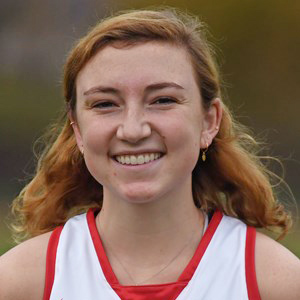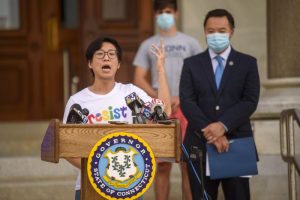E2020 Experiences Shape Students’ Views of the Election

Led by the Jewett Center for Community Partnerships (JCCP), the University launched its new Engage 2020 (E2020) Initiative last fall to deepen Wesleyan’s commitment to civic engagement. To date, 33 students have already received funding to support the development of their civic literacy and their preparedness to engage in political life through hands-on experiences such as working to register voters, issues advocacy, and volunteering on political campaigns. E2020 encourages participation regardless of political affiliation or stances on specific issues.
Since the initiative’s inauguration, Wesleyan has joined forces with colleges and universities across the U.S. to reaffirm the University’s collective responsibility as institutions of higher learning. (Read more about how E2020 has supported student action in civic life in this September 2020 Wesleyan University Magazine article.)
Leading up to the election, three E2020 veterans offered to reflect on their experiences and explained whether, and how, they helped shape their views of the 2020 presidential election and the current political climate.

Government and economics double major Dani Dittmann ’22 interned with Deb Ciamacca’s campaign for Pennsylvania state representative in Pennsylvania’s 168th District, and as she had hoped, she gained much confidence in speaking about politics today, especially the importance of local elections in a swing state. Although her internship concluded at the end of the summer, Dittmann continued to help with the campaign this fall, whether it was phone banking or helping out with social media content.
On campus, Dittmann co-founded a club named New Voters at Wesleyan, which has been registering high school students to vote in Connecticut and beyond. And she also signed up to be the field hockey team’s Voice in Sport’s “More Votes More Voices” campaign team leader. She kept track of teammates’ voter registration status and made sure every member of her team had a plan to vote.
“My E2020 project absolutely impacted me and my actions leading up to the election,” she said. “My experience definitely ignited something within me to ensure I was making some kind of tangible difference leading up to Nov. 3. The experience definitely encouraged me to be as involved as I am in voter registration work and political discussions on campus, and I am so grateful!”
This summer, American studies major and African American studies minor Simon Gaughan ’22 interned for the David Buchwald for Congress Campaign in Rockland County, N.Y. Buchwald ultimately lost to attorney Mondaire Jones in the Democratic primary, but Gaughan felt the experience provided him with invaluable experience. “I was ultimately very pleased when Mondaire Jones won the primary,” he said.
Gaughan’s main goal as an E2020 intern was to observe the dynamics of a political campaign on the ground floor: the types of personalities the work attracts, the menial labor it requires, and the mindsets surrounding the social justice issues he was most passionate about. Although Gaughan achieved these goals, he completed the internship feeling disinclined towards campaign work.
“As an intern, most of my work included calling potential supporters and urging them to vote for David Buchwald. While I enjoy engaging with new people, this work proved to be very challenging. Most of the potential supporters I called were very abrasive, leading most of my work to consist of apologies and awkward hang-ups. This work was character building, of course, but also very unpleasant. While some people are surely more driven toward this work than others, I am uncertain it is for me,” he said.
In early June, the peak of the Buchwald campaign coincided with the surge of Black Lives Matter protests and civil unrest. The campaign managers instructed interns to tweak the usual script to include how David Buchwald had been attending protests in his area, also emphasizing his racially progressive history as a state assemblyman.
“Something about this method didn’t sit right with me. While I understand that a significant portion of politics is simple PR, I felt immoral using the country’s ongoing civil rights movement as a talking point to make my white candidate sound more appealing to Black voters. To add another layer, Buchwald’s primary opponent was Mondaire Jones, the self-declared ‘AOC candidate’ running to be the first openly gay, Black man in Congress. As I made phone calls for David Buchwald during the day and attended Black Lives Matter protests at night, I started to feel very hypocritical. Did I really want to be encouraging people to vote for another straight, white man to take up a seat in Congress?”
Having made a commitment to the David Buchwald team, Gaughan finished up the campaign strong, and learned valuable lessons. The experience helped him realize he’s most passionate about combatting the country’s systems of racial oppression in the prison industrial complex, the police state, the medical-industrial complex, and education inequality. And now he’s exploring the options of being a lawyer, a grassroots community organizer, a lobbyist, or even a politician as a means of working to disassemble these racist institutions.
“My peers here at Wesleyan have taught me to thoroughly interrogate my own activism and the motivations behind it. After working for the David Buchwald Congressional Campaign, I feel as though I would rather work directly against the system from the outside, not having to worry about sugarcoating and dog-whistling to appeal to certain demographics. I think that a field with more creativity, art, and radical ideologies would benefit me, as well,” Gaughan said. “All around, I am very happy that I decided to intern with a congressional campaign this summer. While it did not leave me convinced that campaigning is the career for me, it did prompt more reflection as to what I want my ‘next steps’ after Wesleyan to be.”

Bryan Chong ’21 received an E2020 grant to work as the communications coordinator for Brandon Chafee’s campaign for state representative in Middletown’s 33rd District during the summer. Also, in July Chong created templates for calling and emailing Congress to push back against a Trump administration policy that would prevent international college students from remaining in the U.S. if their classes are held exclusively online. In addition, Chong spoke during a press conference at the Connecticut State Capitol in which Attorney General William Tong announced a lawsuit filed by Connecticut, 16 other states, and the District of Columbia, against the Trump Administration.
“Throughout the triple crises of the pandemic, the economy, and racial justice this year, it has never been more stark to me the limits of electoral politics and the legislative process in a society where BIPOC and working-class people are routinely, actively, and violently shut out of the political system,” he said. “In response to these crises, where civic institutions that we grew up believing in—such as the police, the Electoral College, and the Supreme Court—have failed us time and again, people are finding that direct action, whether it be tenant organizing against predatory landlords, union organizing for humane working conditions, or mutual aid for community solidarity, among other tactics, are more effective not only for material improvement in the lives of marginalized peoples, but also for building community power on the path towards self-liberation. Winning elections is important, but elections are only meaningful with the backing and mandate of a strong, multiracial working-class movement.”

